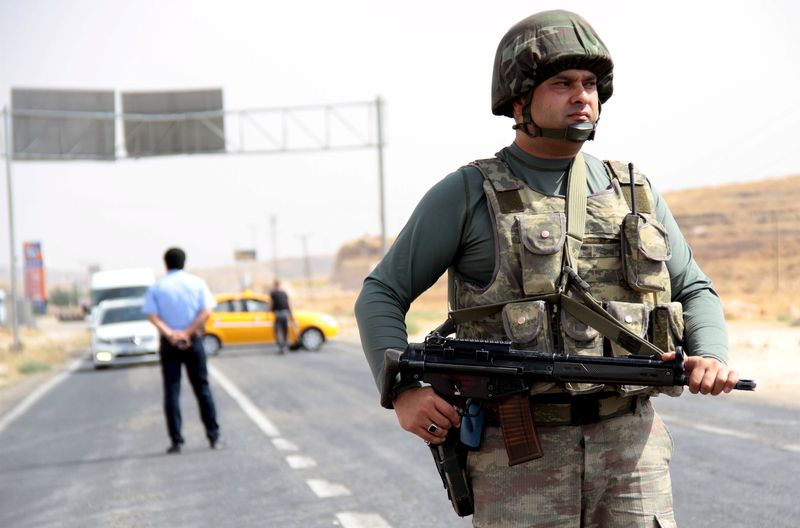By Seyhmus Cakan
DIYARBAKIR, Turkey (Reuters) - Rising violence in southeast Turkey following the collapse of a ceasefire between the government and Kurdish insurgents will make it difficult to hold an election due on Nov. 1, the head of the pro-Kurdish parliamentary opposition said on Wednesday.
Turkey's mainly Kurdish southeast has seen almost daily clashes between militants from the outlawed Kurdistan Workers Party (PKK) and security forces since July.
The conflict has shattered a peace process begun by President Tayyip Erdogan in 2012 to end an insurgency that has killed more than 40,000 people over three decades.
Finance Minister Mehmet Simsek said political instability posed the biggest risk to the economy, a rare admission by the ruling AK Party that politics could further hamper Turkey's once-impressive growth.
Fighting has intensified before the parliamentary election, which the AKP hopes will restore its single-party majority and furnish a mandate for stronger presidential powers for Erdogan. Opinion polls suggest, however, an overall AKP majority is unlikely.
On Tuesday, nationalist crowds attacked the office of a newspaper in Istanbul and the Ankara headquarters of the pro-Kurdish Peoples' Democratic Party (HDP).
A video released by the HDP showed its offices in the Mediterranean town of Alanya ablaze.
"It is becoming impossible to hold an election given the security situation in the region," Selahattin Demirtas, the head of the HDP, told a news conference in the southeastern city of Diyarbakir.
"We want an election to be held and we are not saying an election can't be held, but we want the conditions in the region to be improved for an election."
The prosecutor's office in Diyarbakir said late on Wednesday investigations had begun into Demirtas over comments he had made on the grounds that they insulted the Turkish state, incited crime, insulted the president and were terrorist propaganda.
It said a request had been made to lift the immunity from prosecution which Demirtas has as a member of parliament.
More than 40 Turkish warplanes have hit PKK targets this week in northern Iraq, where the group has bases, in response to Sunday's killing of 16 soldiers near the Iraqi border, the deadliest PKK attack since the ceasefire collapsed.
The latest of these airstrikes was carried out late on Tuesday on PKK targets in Daglica, a southeastern province close to the Iraq and Iran borders, a security source told Reuters.
More than 100 members of Turkish security forces have been killed since the conflict resumed in July, based on information from government officials and security sources. Some 2,000 PKK militants have been killed, according to Erdogan.
The PKK, designated a terrorist organisation by Turkey, the United States and European Union, launched its separatist insurgency in 1984.
93 DETAINED IN ISTANBUL
In Istanbul, 93 people were detained over damage to property during nationalist protests on Tuesday night. Among buildings attacked was the headquarters of the mass-circulation newspaper Hurriyet.
An AKP deputy was among the protesters outside the Hurriyet building at an initial demonstration on Sunday night, and U.S. State Department spokesman John Kirby said he was concerned by reports that AKP members had encouraged protests.
"Elected officials must be careful not to appear to encourage violence against media outlets," he said.
Intercity bus journeys from Diyarbakir to western Turkey were cancelled on Wednesday after buses came under attack from protesters who smashed windows with sticks and stones.
Dogan news agency said many businesses in southern Turkey's Manavgat district, within the Mediterranean tourism hub of Antalya, were attacked by protesters with sticks and stones for not hanging out Turkish flags.
HDP lawmaker Pervin Buldan accused Erdogan of using inflammatory language to stir up tensions and encouraging attacks against the party buildings, warning street violence could turn fatal.
"These are all decisions aimed at taking the country to elections in a ring of fire," she told Reuters in an interview on Tuesday.
Turkish society has become sharply polarised, and with Erdogan fanning nationalist sentiment to bolster support for upcoming elections, the risk of the current insecurity stirring ethnic tensions is high,
"The government must reduce tensions," Suleyman Ozeren, a security analyst Ankara-based think-tank Global Policy and Strategy, told Reuters. "The PKK has never managed to stir up a climate of ethnic violence before, but if they continue to carry out big attacks, who knows?"

(Additional Reporting by Daren Butler, Ebru Tuncay, Ayla Jean Yackley and Humeyra Pamuk in Istanbul and Jonny Hogg, Ece Toksabay and Dasha Afanasieva in Ankara; Writing by David Dolan; editing by Ralph Boulton, Larry King)